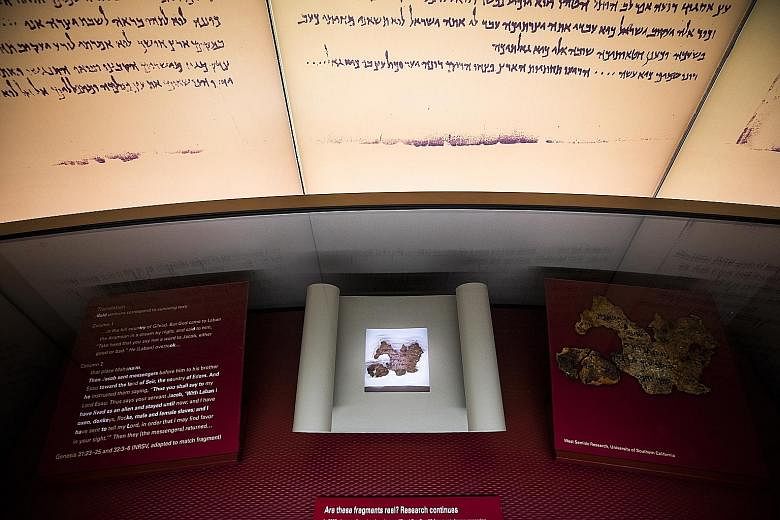WASHINGTON • The sceptics were dead right - the artefacts were fakes.
On Monday, a museum in the United States announced that five artefacts it had said were fragments of ancient manuscripts known as the Dead Sea Scrolls are, in fact, not authentic and will no longer be displayed.
Washington's Museum of the Bible removed the pieces from exhibition after a German research institution concluded that they were not old enough.
"Though we had hoped the testing would render different results, this is an opportunity to educate the public on the importance of verifying the authenticity of rare biblical artefacts, the elaborate testing process undertaken and our commitment to transparency," said the museum's chief curator, Mr Jeffrey Kloha.
"As an educational institution entrusted with cultural heritage, the museum upholds and adheres to all museum and ethical guidelines on collection care, research and display."
The Dead Sea Scrolls, which include the oldest known manuscripts of the Hebrew Bible, date from 3BC to AD1.
Numbering about 900, they were discovered between 1947 and 1956 in the Qumran caves above the Dead Sea that borders Israel, the West Bank and Jordan.
The five fragments had been exhibited in the sprawling museum since it opened in November 2017, but were labelled with explanations that research on their legitimacy was under way.
In April last year, the museum sent five of its 16 Dead Sea Scroll pieces to Germany's Federal Institute for Materials Research and Testing for testing after previous studies questioned their authenticity.
Researcher Kipp Davis of Trinity Western University had published work saying "at least seven fragments in the museum's Dead Sea Scrolls collection are modern forgeries".
The museum has removed the five pieces tested in Germany from display and replaced them with three others, which are also the focus of further analysis.
The Museum of the Bible raised eyebrows even before opening its giant bronze, Latin-inscribed gates.
Its primary financial backer is billionaire Steve Green, whose arts-and-craft chain Hobby Lobby has supported conservative causes in Washington.
Just months before the museum opened, the company was forced to pay a US$3-million settlement and give up 5,500 artefacts - including ancient clay cuneiform tablets from Iraq - that the US Justice Department said were illegally imported.
AGENCE FRANCE-PRESSE

